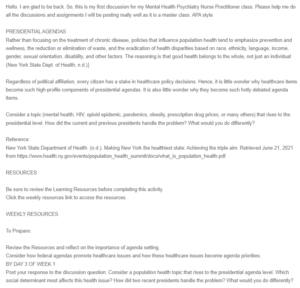Question Hello. I am glad to be back. So, this is my first discussion for my Mental Health Psychiatry Nurse Practitioner class. Please help me do all the discussions and assignments I will be posting really well as it is a master class. APA style. Presidential Agendas – Mental health PRESIDENTIAL AGENDAS Rather than focusing on the treatment of chronic disease, policies that influence population health tend to emphasize prevention and wellness, the reduction or elimination of waste, and the eradication of health disparities based on race, ethnicity, language, income, gender, sexual orientation, disability, and other factors. The reasoning is that good health belongs to the whole, not just an individual (New York State Dept. of Health, n.d.). Regardless of political affiliation, every citizen has a stake in healthcare policy decisions. Hence, it is little wonder why healthcare items become such high-profile components of presidential agendas. It is also little wonder why they be
Presidential Agendas – Mental Health
Mental health has emerged as a significant population health topic that has gained attention at the presidential agenda level. One of the prominent social determinants associated with mental health is socioeconomic inequity, which affects both parents and children. Families living in low socioeconomic status often face multiple stressors related to health concerns, social relationships, finances, and employment situations (Reiss et al., 2019).
Both current and former presidents have recognized the importance of improving mental health. For instance, former President Obama signed the Mental Health Parity and Addiction Equity Act, whose objective was to ensure equitable and non-discriminatory insurance coverage for individuals with substance use disorders and mental health (Department of Insurance and Financial Services, 2019). The signing of this act positively resulted in the use of outpatient substance use and mental disorder services by Americans who are covered by employer-sponsored large-group insurance. Similarly, President Biden has also prioritized mental health on his agenda by signing and investing in the American Rescue Plan Act (The White House, 2022). This act aims to expand affordable mental health services for children and improve healthcare services for early detection, diagnosis, treatment, and referral of behavioral disorders (Dalabih et al., 2022).
Personally, I advocate for increased investments in mental health to ensure everyone can access high-quality mental health services. First, integrating mental health into primary care is essential to facilitate early intervention and identification of mental health concerns. Moreover, expanding education and awareness initiatives can help reduce the stigma associated with mental health and increase knowledge about available treatment options for mental disorders. Additionally, prioritizing workforce development in mental health services would ensure that underserved areas have an adequate number of trained professionals. Finally, further improvisation of mental health services through telemedicine can enhance access for underserved and remote communities.
Are you interested in an unpublished edition of the assignment ? Get in touch with us. Our team of experts is ready to help.
References
Dalabih, A., Bennett, E., Javier, J. R., Shah, S., Raphael, J., Patel, M., Davis, J., Pursley, D., Cheng, T., Devaskar, S., Javier, J., & Lee, L. (2022). The COVID-19 pandemic and pediatric mental health: advocating for improved access and recognition. Pediatric Research, 91(5), 1018–1020. https://doi.org/10.1038/s41390-022-01952-w
Department of Insurance and Financial Services. (2019). Mental Health Parity and Addiction Equity Act of 2008. SOM – State of Michigan. https://www.michigan.gov/difs/consumers/insurance/health-insurance/mental-health-parity/mental-health#:~:text=What%20is%20MHPAEA%3F
Reiss, F., Meyrose, A., Otto, C., Lampert, T., Klasen, F., & Ravens-Sieberer, U. (2019). Socioeconomic status, stressful life situations and mental health problems in children and adolescents: Results of the German BELLA cohort study. PLOS ONE, 14(3), e0213700. https://doi.org/10.1371/journal.pone.0213700
The White House. (2022, May 31). Fact sheet: Biden-Harris Administration highlights strategy to address the National Mental Health Crisis. The White House. https://www.whitehouse.gov/briefing-room/statements-releases/2022/05/31/fact-sheet-biden-harris-administration-highlights-strategy-to-address-the-national-mental-health-crisis/
